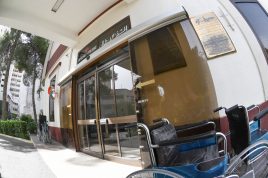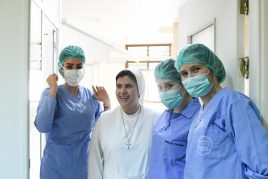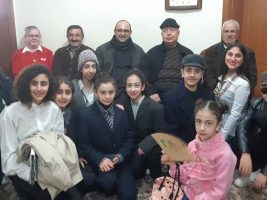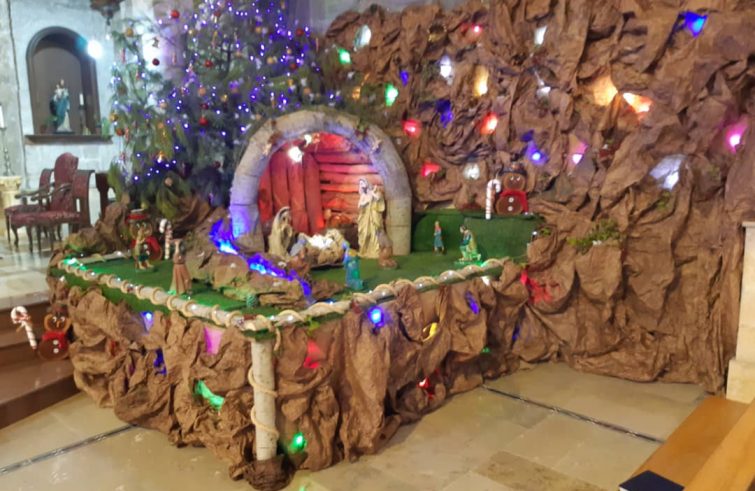
“Each year, as Christmas draws near, my thoughts go to the birth of Jesus, to the fact that the Holy Family found no suitable dwelling place in Bethlehem, but only a grotto where they took shelter.
“The poverty into which our Lord Jesus was born in Bethlehem, is the same poverty experienced over the past decade by countless families in war-torn Syria.”
Cardinal Mario Zenari, Apostolic Nuncio to Syria, describes the conditions afflicting Syrian children and their families, with only ten days to go before Christmas. The Nuncio’s constant thoughts are directed to Syrian children, with a tireless commitment in the area. “The Pope has given me this scarlet sash that it is as long and wide as Syria,” he told SIR. “This mission is a special grace from God: to share the destiny of Syria’s afflicted population.”
Damascus. “As in the past, it will be a Christmas of poverty, in the cold, as it was in Bethlehem’s Grotto” said the Cardinal who has been repeatedly denouncing the humanitarian crisis in Syria, involving about 12 million people including refugees outside of the Country and internally displaced persons. “These families are living in dire conditions, in tents, far away from their homes, some of them even in the open air. There is a shortage of heaters and those who have them cannot light them due to the lack of fuel. I frequently see people standing in endless lines on the streets to buy government-subsidized bread.” Rockets and mortars have stopped striking against Damascus and other areas of Syria, but the “poverty bomb” has exploded, he remarked. The nuncio cited UN data: “83% of the overall population lives below the poverty line and this is killing people’s hope. They need bread, milk, fuel, medicines”. His thoughts go to the “suffering of the youngest who see their parents come home with only a small amount of bread, often of poor quality owing to the shortage of quality flour.” The war has taken a heavy toll also on solidarity.
The Nuncio said: “A few days ago, a local cleric inaugurated a bakery 30 km north of Damascus, donated by a European country. The bakery had to shut down due to fuel shortage”.
- Foto Calvarese/SIR
- Damasco, foto SIR/Marco Calvarese
Poverty was aggravated by the COVID-19 pandemic. “We have no official data on the contagion, there are very few testing-swabs. The fact that Syria is a closed country, with no one arriving, has probably limited the spread of the virus to date.” “We started offering home care in three Catholic hospitals, two in Damascus and one in Aleppo, thanks to the “Open Hospitals” project, carried out jointly with the AVSI Foundation. Nine nuns were infected in the Italian hospital in Damascus and one died,” His Eminence said. “National Syrian healthcare service is reduced to a minimum due to the war. Protective equipment is scarce, coupled by the challenge of educating the population to adopt the appropriate sanitary precautions. Many families live in dwellings lacking toilet facilities. Refugees are stranded in camps without social distancing.
“Bread, not face masks, is the greatest need in Syria today.”
“May this Christmas warm the hearts of countless people around the world. That they may remember Syria in spite of the pandemic. Let us draw from our suffering and help those who are facing a greater tragedy.”
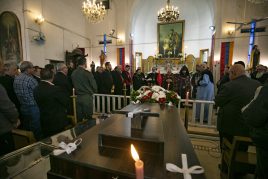 Qamishli. The words of the nuncio are echoed by Father Antonio Ayvazian, Armenian parish priest of Qamishli, in northeastern Syria, and by Father Hanna Jallouf, Franciscan friar from the Custody of the Holy Land and Latin parish priest of Knaye, one of the three Christian villages in the Orontes Valley (the others are Yacoubieh and Gidaideh, situated some 50 km from Idlib), two crisis areas. “Here in the north-eastern regions there are 13 Armenian Christian villages scattered throughout the mountains with below zero temperatures, and fuel for home heating is urgently needed,” Father Ayvazian told SIR, denouncing “the embargo and international sanctions that are destroying Syria and causing the exodus of Christians with the silence of Western countries. Only the Apostolic Nunciature shows concern.” Now all hopes are placed in the relief sent by Pope Francis to dioceses throughout Syria, amounting to €60,000 for each one. Christian communities have buckled down against COVID. “We secured oxygen tanks and protective gear for 100 people jointly with the religious leaders of our region,” said the Armenian parish priest. Families are the greatest emergency: “Christmas is near, and feelings of abandonment and loneliness afflict the families. Households lack the means to make Christmas trees and nativity scenes because feeding their children is their primary concern. A small amount of food would be enough to enable these families to enjoy a few festive moments. But there is little they can afford with their monthly income of just a few dollars. People are desperate – denounced Father Ayvazian – many young women have reached the point of selling their virginity to survive.” “At Christmas there will be no nativity scene and no tree. But we still have our greatest gift: the faith we cling on to which keeps our hopes alive.”
Qamishli. The words of the nuncio are echoed by Father Antonio Ayvazian, Armenian parish priest of Qamishli, in northeastern Syria, and by Father Hanna Jallouf, Franciscan friar from the Custody of the Holy Land and Latin parish priest of Knaye, one of the three Christian villages in the Orontes Valley (the others are Yacoubieh and Gidaideh, situated some 50 km from Idlib), two crisis areas. “Here in the north-eastern regions there are 13 Armenian Christian villages scattered throughout the mountains with below zero temperatures, and fuel for home heating is urgently needed,” Father Ayvazian told SIR, denouncing “the embargo and international sanctions that are destroying Syria and causing the exodus of Christians with the silence of Western countries. Only the Apostolic Nunciature shows concern.” Now all hopes are placed in the relief sent by Pope Francis to dioceses throughout Syria, amounting to €60,000 for each one. Christian communities have buckled down against COVID. “We secured oxygen tanks and protective gear for 100 people jointly with the religious leaders of our region,” said the Armenian parish priest. Families are the greatest emergency: “Christmas is near, and feelings of abandonment and loneliness afflict the families. Households lack the means to make Christmas trees and nativity scenes because feeding their children is their primary concern. A small amount of food would be enough to enable these families to enjoy a few festive moments. But there is little they can afford with their monthly income of just a few dollars. People are desperate – denounced Father Ayvazian – many young women have reached the point of selling their virginity to survive.” “At Christmas there will be no nativity scene and no tree. But we still have our greatest gift: the faith we cling on to which keeps our hopes alive.”
Idlib. From Knaye in northwest Syria, Father Hanna Jallouf describes the daily life of the few local Christians as Christmas draws near. Long-standing challenges – war, poverty, the jihadist rebels of Tahrir al-Sham, former al-Nusra Front, linked to al-Qaeda and an ally of Turkey – are exacerbated by the difficulties linked to the ongoing pandemic. “The militia ruling this area have imposed the use of the Turkish lira for about a month now,” the Franciscan priest remarked. “Prices increased fourfold and the people are desperate. We don’t know how to help the families.” Heightened tensions are fuelled by “clashes between the leaders of the Islamist factions. Those who oppose Tahrir al-Sham are killed”, he said. “No one can enter or leave rebel-held territory.
“There are many refugees and internally displaced persons. Some have tried to return but the militia groups won’t allow them. The roads have been closed for 11 months”.
Ten days to Christmas which the Christian community is looking forward to. Jihadist groups have banned outdoor decorations and illuminations, they removed all crosses from the churches, and prohibited Father Hanna and his brother, Father Louai Bsharat, from wearing their religious habits. About 300 Christian families living in this area have no other choice than to celebrate inside the church and at home. “Last December 4th we celebrated St. Barbara, which is like Carnival for us,” said Father Jallouf. We organized a display of our children’s works created with waste materials, such as old light bulbs. Children then took these Christmas items home with them as a sign of festivity. We also made crosses to decorate Christmas trees and nativity scenes at home. We have not sent our children to jihadist schools this year, about forty in all, so we were also able to sing and stage plays. They seem to be quite happy. Thanks to them we can say that we have a future here.
- Cristiani di Knaye, Siria
Other initiatives are already in place: “The Christmas Novena starts on December 15, on the 23rd we will hand out small gifts to children. On December 24th and 25th, after Mass, we will celebrate with some sweets.”
“Celebrating Christmas is a sign of hope and joy for everyone. Divine Providence never abandons us: when I have nothing more to give, I say to the Lord, this is your flock, who shall care for it? Then help always arrives.”

